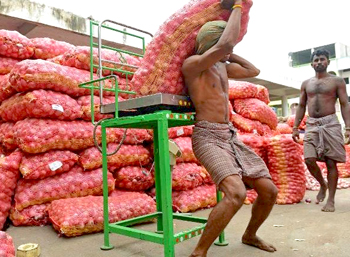New Delhi, Jul 5: With highest-ever single-day spike of 24,850 COVID-19 cases in 24 hours, India's coronavirus count stood at 6,73,165, informed the Union Ministry of Health and Family Welfare on Sunday.
Out of the total cases, 2,44,814 are active cases. On the other hand, India's cured/discharged patients count crossed the 4 lakh mark with 4,09,082 patients cured/discharged and one patient migrated.
As many as 613 deaths due to coronavirus were reported in the country in the last 24 hours taking the death toll in the country to 19,268.
Meanwhile, the ministry said that collective and focused efforts for containment and management of COVID-19 by the government of India along with the States/UTs have led to the number of recovered cases among COVID-19 patients rise to 4,09,082 as of today.
"During the last 24 hours, a total of 14,856 COVID-19 patients have been cured. So far, there are 1,64,268 more recovered patients than COVID-19 active cases. This takes the national recovery rate amongst COVID-19 patients to 60.77 per cent," the ministry said.
"With 786 labs in government sector and 314 private labs, there are as many as 1,100 labs in India," it added.
As per the Health Ministry, coronavirus cases in Maharashtra -- the worst affected state from the infection -- has breached the 2 lakh mark with 2,00,064 cases including 8,671 deaths.
Tamil Nadu reported 4,150 fresh COVID-19 cases and 60 deaths today, taking total cases to 1,11,151 and death toll to 1,510. Number of active cases stands at 46,860, according to the State Health Department.
Delhi's coronavirus tally nears the 1 lakh mark with 99,444 cases and the number of people succumbing to the virus stands at 3,067 in the national capital. As many as 9,873 RT-PCR tests and 13,263 rapid antigen tests were conducted today in Delhi. Total tests done so far stands at 6,43,504.
Meanwhile, Indian Council of Medical Research informed that the total number of samples tested up to July 4 is 97,89,066 of which 2,48,934 samples were tested yesterday.
There were seven new COVID-19 cases in the last 24 hours in Chandigarh, taking total cases to 466 including 395 recoveries and six deaths.
Himachal Pradesh Health Department informed that COVID-19 cases reach 1,048 in the state, of which, 309 cases are active and 715 have recovered.
Andhra Pradesh has reported 998 new COVID-19 cases and 14 deaths in the last 24 hours, according to a media bulletin released by AP state COVID nodal officer.
A total of 1,155 COVID-19 cases were reported in the last 24 hours in Uttar Pradesh on Sunday, taking the total number of active cases to 8,161 in the state, an official said. According to the official data, a total of 18,761 people have been cured while 785 people have died due to the virus in the state.
Eighteen more personnel of Indo-Tibetan Border Police (ITBP) tested positive for COVID-19 in the last 24 hours. There are total 151 active cases and 270 have recovered till date.
While, in the last 24 hours, 36 more Border Security Force (BSF) personnel tested positive for COVID-19 and 33 have recovered. There are 526 active cases and 817 personnel have recovered till date.
In Rajasthan, 224 fresh COVID-19 positive cases and 6 deaths were reported today. The total number of cases rose to 19,756 including 3,640 active cases and 453 deaths.
Odisha reported 469 new COVID19 positive cases in the last 24 hours, taking the total number of positive cases in the state to 9,070 including 5,934 recovered cases and 3,090 active cases, according to the health department.
Uttarakhand reported 31 new COVID-19 cases in the last 24 hours, taking total cases to 3,124. Recovery rate among COVID-19 patients stands at 80.79 per cent.
 Mumbai, Dec 16: India's wholesale inflation rate fell to a five-and-a-half-year low, driven by ongoing falls in fuel and food prices, data showed on Monday (Dec 15), boosting hopes of an interest rate cut early next year.
Mumbai, Dec 16: India's wholesale inflation rate fell to a five-and-a-half-year low, driven by ongoing falls in fuel and food prices, data showed on Monday (Dec 15), boosting hopes of an interest rate cut early next year.




Comments
Add new comment